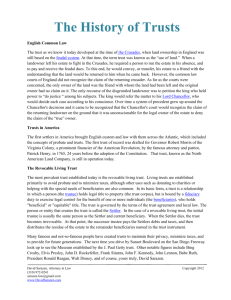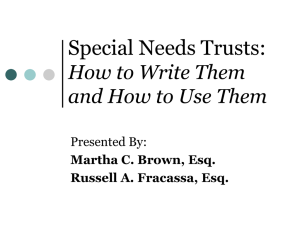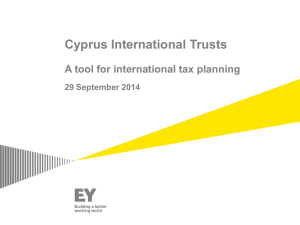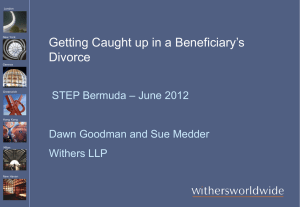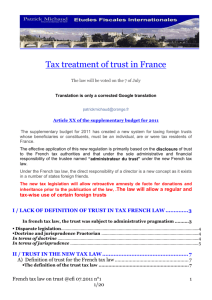Trusts in Quebec - Sun Life Financial
advertisement
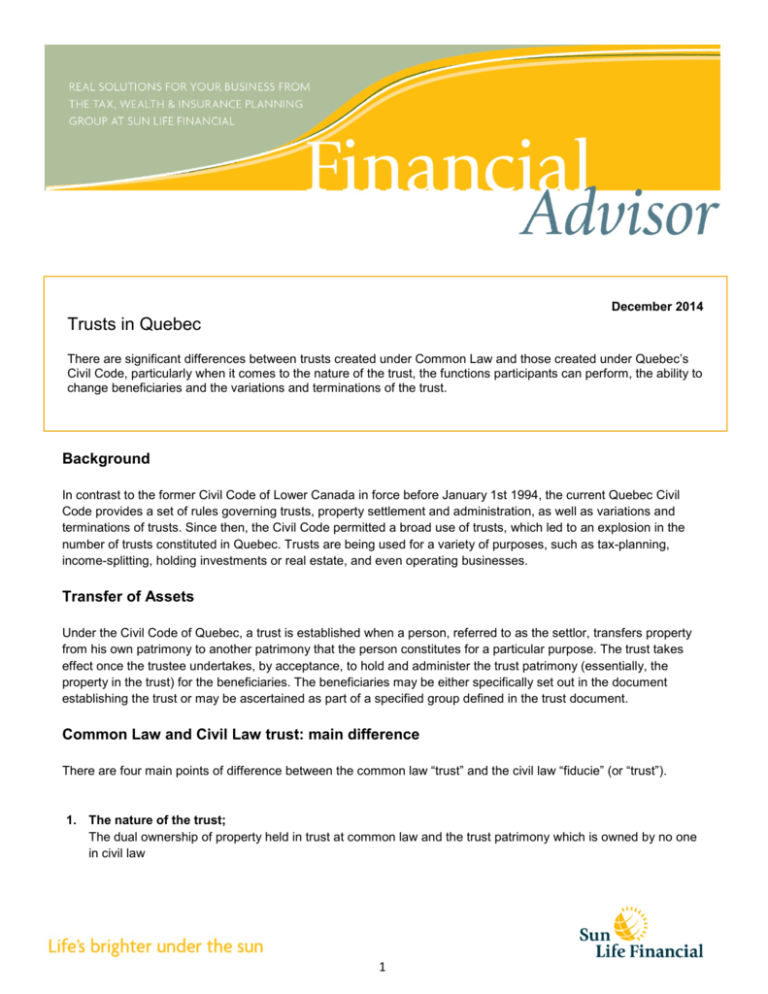
December 2014 Trusts in Quebec There are significant differences between trusts created under Common Law and those created under Quebec’s Civil Code, particularly when it comes to the nature of the trust, the functions participants can perform, the ability to change beneficiaries and the variations and terminations of the trust. Background In contrast to the former Civil Code of Lower Canada in force before January 1st 1994, the current Quebec Civil Code provides a set of rules governing trusts, property settlement and administration, as well as variations and terminations of trusts. Since then, the Civil Code permitted a broad use of trusts, which led to an explosion in the number of trusts constituted in Quebec. Trusts are being used for a variety of purposes, such as tax-planning, income-splitting, holding investments or real estate, and even operating businesses. Transfer of Assets Under the Civil Code of Quebec, a trust is established when a person, referred to as the settlor, transfers property from his own patrimony to another patrimony that the person constitutes for a particular purpose. The trust takes effect once the trustee undertakes, by acceptance, to hold and administer the trust patrimony (essentially, the property in the trust) for the beneficiaries. The beneficiaries may be either specifically set out in the document establishing the trust or may be ascertained as part of a specified group defined in the trust document. Common Law and Civil Law trust: main difference There are four main points of difference between the common law “trust” and the civil law “fiducie” (or “trust”). 1. The nature of the trust; The dual ownership of property held in trust at common law and the trust patrimony which is owned by no one in civil law 1 2. The plurality of the functions of settlor, trustee, and beneficiary; Plurality of offices or functions is not permitted by the Civil Code of Quebec, since CCQ Article 1275 provides that the settlor or the beneficiary may be a trustee but he shall act jointly with a trustee who is neither the settlor nor a beneficiary. This is true for Common Law trusts except that there is no requirement to act jointly. 3. The power to appoint beneficiaries; In common law the settlor may give the trustee unlimited power to add or remove trust beneficiaries. However, the granting of such power is not permitted under civil law for trusts other than social trusts. 4. The variation and termination of the trust; The rules governing the variation and termination of a trust depend on the jurisdiction. Although, in principle, variation and termination can be effected on the mere consent of the beneficiaries, such modifications are generally subject to certain requirements specified under provincial laws. For example, the procedure in civil law necessitates an application to the court in such circumstances. In the civil law, the right of beneficiaries of the first rank opens not later than 100 years after the trust is constituted, even if a longer term is stipulated. The right of beneficiaries of subsequent ranks may open later but solely for the benefit of those beneficiaries who have the required quality to receive at the expiry of 100 years after the constitution of the trust. In no case may a legal person be a beneficiary for a period exceeding 100 years, even if a longer term is stipulated. Other examples of differences in civil law include the prohibition against appointing a corporate trustee other than a trust company, the absence of a protector, the absence of extensive jurisprudence on trusts, and the impossibility of using declarations of trust. Functions of settlor, trustee, and beneficiary under the civil law A trust created under the Civil Code requires the settlor to transfer assets to a separate patrimony by affectation, autonomous and distinct from the settlor, the trustee and the beneficiary. Here, the trustee and beneficiary have no ownership rights to this new property. • The settlor (or transferor) The settlor is the person who sets up the trust. In Québec, a trust can only be set up either during the transferor's lifetime (inter vivos trust) or upon the transferor's death (testamentary trust) until all property in the trust has been distributed to the heirs. • The Trustee The Quebec Civil Code provides specific rules for appointing the trustee and his or her acceptance of duty. The trustee is assigned the full administration of the property of the trust, including the preservation and maintenance of the assets. The trustee holds and manages the property placed in trust and reports to the transferor, beneficiary, and any other party involved. The trustee also ensures strict compliance with the provisions of the trust act that protect the rights of the beneficiary. Equally as important, the trustee also has an obligation to increase the patrimony or use it for its intended purpose as specified in the trust agreement. A trustee’s authority is defined in the trust agreement. In the case of a personal or a private trust, the Quebec Civil Code restricts the power of a trustee to appoint a beneficiary only to the class of person clearly determined in the document that creates the trust. While settlors are prevented from appointing themselves as the only trustee, the rules do offer trustees more security than Common Law trusts, when it comes to personal liability. 2 • The beneficiary The beneficiary is the person designated in the trust act to receive the property, under certain conditions. Depending on the terms of the trust contract, the beneficiary may have the right, for example, to draw an income from the trust up to a certain age, then cash in the balance. For tax purposes, a trust is considered a distinct entity separate from the transferor and beneficiary. Also for tax purposes, the trust can have more than one beneficiary, and benefits can be split between income and capital or be a combination of both. When a beneficiary of the trust is a minor, the trustee is not required to guarantee the administration of the trust to the Public Curator, as is the case for tutors (guardians) and estate liquidators when they are responsible for assets of $25,000 or more. Kinds of Trusts in Quebec The Quebec Civil Code provides for three kinds of trusts. While there are rules that apply to all three, there are also specific rules for each of them. 1) Personal Trusts These trusts are created for personal reasons and use a donation to secure benefits for a determinate or determinable person. Example: testamentary trusts. A testamentary trust is a trust that arises on the death of an individual and as a consequence thereof. The terms of such a trust are created: by will by law, or by court order (for example, pursuant to the application of legislation providing for an obligation of support on behalf of dependents). 2) Private Trusts Private trusts are created for specific private purposes like maintaining or preserving a property for a specific use. Example: A Retirement Compensation Arrangement trust (RCA). 3) Social Trusts This trust is created for social reasons such as supporting cultural, educational, philanthropic, religious or scientific interests. Example: A charitable foundation. Civil Law Trusts and the Income Tax Act The Income Tax Act governs the taxation of a trust, even in Quebec. However, the different rules that create the trust under Common Law or Civil Law can result in different tax treatment. It’s important for the trust agreement to address tax matters in context of the rules governing the trust. Registering Trusts in Quebec All those who administer or have an interest in a trust should be noted a new registering rule since July 1, 2014. Thus, based upon an amendment to Québec’s Act respecting the legal publicity of enterprises (the “Legal Publicity Act”) any trust (regardless of the jurisdiction where it is formed and regardless of the law governing the trust) that operates a “commercial enterprise” in Quebec will have to register under the Legal Publicity Act, much in the same way that corporations carrying on activity in Québec are currently required to register under the Legal Publicity Act. 3 The concept of “Enterprise” is defined at Article 1525 of the Civil Code of Québec– and the commercial character refers essentially to the making of profits. Every effort has been made to ensure the accuracy and currency of the information provided. However, any examples presented in this article are for illustration purposes only. No one should act upon these examples or information without a thorough examination of the tax and legal situation with their own professional advisors after the facts of the specific case are considered. This article is intended to provide general information only. Sun Life Assurance Company of Canada does not provide legal, accounting or taxation advice to advisors or clients. Before a client acts on any of the information contained in this article, or before you recommend any course of action, make sure that the client seeks advice from a qualified professional, including a thorough examination of their specific legal, accounting and tax situation. Any examples or illustrations used in this article have been included only to help clarify the information presented in this article, and should not be relied on by you or a client in any transaction. Reviewer: Jean Turcotte, B.A.A., LL.B., Avocat, D.Fisc., PL.Fin., TEP First published: January 2004 Last revised: December 2014 © Sun Life Assurance Company of Canada, 2015. Sun Life Assurance Company of Canada is a member of the Sun Life Financial group of companies. 810-4286-Digital-02-15 4

